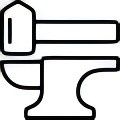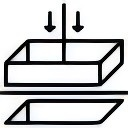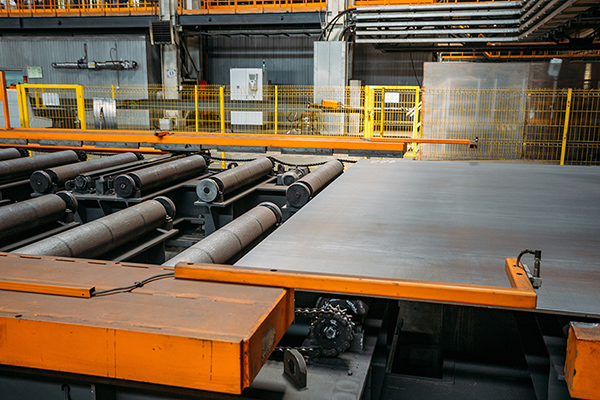
Tool steel designed for high temperature applications is a type of alloy that maintains its strength and durability under elevated temperatures during manufacturing processes, particularly when tools are exposed to heat and require superior resistance to heat and wear over time.
Characteristics of Hot Work Tool Steel
Hot work tool steels are famous for their ability to retain their hardness in environments and are ideal for tasks that need consistency in such conditions. These types of steels show resistance to wear and tear in settings where tools face abrasiveness. Moreover, they also display toughness that allows them to withstand stress without fracturing.
Applications of Hot Work Tool Steel
Hot work tool steel serves purposes in industries like automotive and aerospace by crafting tools for die casting and forging processes, as well as creating molds for plastic injection molding and metal forming applications.
In-depth Analysis of H13 Tool Steel
H13 is one of the most widely used hot work tool steels due to its exceptional properties and versatility. It is known for its ability to perform reliably under extreme conditions.
Composition and Properties of H13
The primary elements found in H13 tool steel include chromium (Cr), molybdenum (Mo), vanadium (V), silicon (Si), manganese (Mn), carbon (C), and iron (Fe). These components give H13 properties such as hardening ability and resistance to wear and heat. Alloy tool steel falls under a category of steel that is improved by incorporating alloying elements like chromium (Cr), molybdenum (Mo), tungsten (W), and vanadium (V). These additional components help H13 retain its characteristics even when exposed to high temperatures.
Advantages of Using H13 in Industrial Applications
In settings, H13 presents numerous benefits for practical use cases. Its notable ability to conduct heat effectively facilitates heat transfer in processes like die casting and forging. The steel’s exceptional resilience to wear and tear makes it perfect for tools subject to frequent heating and cooling cycles. Moreover, H13’s outstanding durability lowers the likelihood of fractures or distortions under strain.
Common Uses for H13 Tool Steel
H13 tool steel is often utilized in producing extrusion dies and die casting dies, as well as crafting forging dies and hot shear blades, due to its capability to endure high temperatures while maintaining hardness and toughness intact for challenging tasks, like molding plastic.
Detailed Examination of S7 Tool Steel
One notable member of the hot work tool steel category is Seven Tool Steel, known for its durability and adaptability to various applications.
Composition and Properties of S7
The composition of S7 tool steel includes carbon (C), chromium (Cr), molybdenum (Mo), silicon (Si), manganese (Mn), nickel (Ni), vanadium (V), phosphorus (P), sulfur (s), and iron (Fe). These elements give S6 toughness and resistance, against shocks and wear while also providing moderate heat resistance capabilities.
Benefits of S7 in High-Impact Applications
In situations where strong impact resistance is needed, like when tools endure sudden heavy blows or loads, S7 stands out for its impressive shock-absorbing capabilities that allow it to withstand significant energy without breaking or bending.
Typical Applications for S7 Tool Steel
Serving purposes like crafting chisels and punches or creating shear blades and riveting tools are common uses for tool steel as it possesses a high impact strength that is suitable for making plastic mold dies and aircraft landing gear components due to its exceptional shock absorbing properties.
When it comes to hot work tool steels such as H13 and S8, having a good grasp of their properties helps industries choose the materials for optimal performance in different situations. They offer solutions in a range of industries where resilience against heat and impact is crucial.
Comparison Between H13 and S7 Tool Steels
Performance Differences in High Temperature Environments
In comparing H13 and S7 tool steels, a notable difference can be seen in how they perform when exposed to temperatures. H13 stands out for its ability to maintain stability and resist fatigue at elevated temperatures, making it a top choice for applications requiring endurance in heat. This quality makes it perfect for die casting and forging dies, where the ability to retain hardness and toughness at temperatures is essential.
Slightly different from that is S tool steel; it offers resistance against heat but is prized mainly for its remarkable ability to withstand impacts rather than for its performance in high temperatures. It is most suitable for situations where tools face impacts or heavy loads instead of prolonged heat exposure.
Cost-effectiveness and Longevity in Industrial Use
When considering cost efficiency and durability factors for applications, H13 and S7 present unique benefits based on specific needs. The durability of H13 in enduring heating and cooling cycles without compromising its mechanical characteristics ensures its longevity in high temperature work settings. This resilience can lead to cost reductions in the run as tools crafted from H13 need less frequent replacements.
The remarkable toughness and resistance to shock of S7 tool steel make it a practical option for tasks that deal with impact forces. Its capacity to absorb energy without breaking helps minimize disruptions, from tool malfunctions resulting in improved efficiency and lower maintenance expenses.
Promispecial® Hot Work Tool Steel Products
Overview of Promispecial® Offerings
Promispecial® provides a selection of hot work tool steel tailored to suit the unique requirements of different sectors. We are crafted to deliver results in challenging settings where heat resistance and durability are crucial factors for success.
Promispecial® steel products consists of custom blends designed to elevate the qualities of hot work tool steels through innovative alloying methods like adding chromium (Cr), molybdenum (Mo), tungsten (W), and vanadium (V). These formulations aim to enhance hardening ability and durability while also boosting resistance to wear and high temperatures—features of alloy tool steels.
Industry-Specific Applications and Benefits
Promispecial® hot work tool steels are widely utilized in industries because of their customized characteristics. In the sector specifically, these steels play a crucial role in producing engine parts that demand durability and resistance to wear, ensuring consistent functionality even in challenging environments.
In aerospace industries, Promispecial® steels play a role in crafting parts, such as turbine blades that function in challenging conditions of high heat and pressure. Their remarkable ability to withstand temperatures helps these crucial components retain their structural strength while in use.
The construction sector gains advantages from utilizing PromiSpecial® products in creating molds for plastic injection molding and metal shaping procedures, as these steels’ remarkable durability helps prolong the lifespan of molds exposed to materials.
Contact Promispecial® for tailored solutions and get more tool steel knowledge to meet the requirements of various industries to improve effectiveness and ensure long-lasting performance in diverse settings.


























